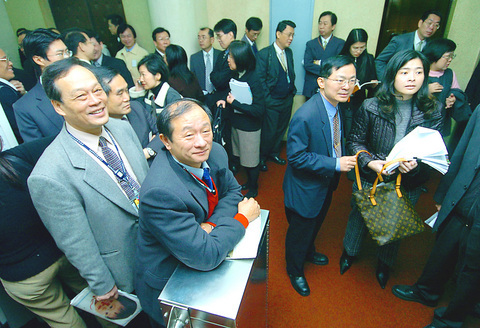The statute governing the arms deal with the US and its related budget plan failed to pass the Procedure Committee again yesterday, while the Democratic Progressive Party's (DPP) proposed resolution asserting the sovereignty of the Republic of China (ROC) was also rejected in the committee session.
Meanwhile, the request for the legislature to review Control Yuan member nominations was also rejected by the pan-blue camp again.

PHOTO: CHIEN RONG-FENG, TAIPEI TIMES
The DPP has attempted to get the statute, the budget plan and the request passed several times, while the sovereignty bill was brought up for discussion in the committee for the first time yesterday.
The DPP first proposed the resolution in an attempt to counter China's anti-secession bill.
The resolution states that the "ROC" is a sovereign and independent country neither governed by nor belonging to China. It also says that the cross-strait "status quo" cannot be changed unless the Taiwanese public consents to the change via referendum.
But the People First Party insisted that the DPP add a part about opposition to Taiwan's independence, or it would not approve of the resolution, and the pan-blue camp again rejected the resolution.
"The sovereignty of the ROC is already something that is acknowledged by the Taiwanese public, and proposing this resolution is like taking one's pants down before farting," Chinese Nationalist Party (KMT) caucus whip Huang Teh-fu (黃德福) said. The Chinese proverb "to take one's pants down before farting" means to engage in an unnecessary act.
Huang said that the most important thing that could be done to defend the ROC's sovereignty was for the pan-green camp to not pursue any activities related to independence.
To defend the resolution, DPP Legislator Lee Wen-chung (
"Since the resolution needs to be approved by the legislature, we can always amend the resolution content," Lee said.
In related news, a partial amendment to the Criminal Code got its second reading in the sitting yesterday, and the amendment stipulates that the death sentence will be abolished gradually.
The amendment further stipulates that a prisoner sentenced to life can request parole only after having served 25 years, up from the current 15 years.
The maximum allowable sentence -- aside from a life sentence or a death sentence -- for a single offense remains 20 years, but a criminal accused of committing several offenses at the same time can receive a 30-year sentence, up from the current 20 years.
The most important change is the tightening of the parole threshold, and the imposing of severer sentences on prisoners committing several offenses at the same time. This is part of the government's policy of gradually abolishing the death sentence.
The amendment is slated to get a third reading -- to be officially approved by the legislature -- in the next sitting on Friday.

Taiwanese can file complaints with the Tourism Administration to report travel agencies if their activities caused termination of a person’s citizenship, Mainland Affairs Council Minister Chiu Chui-cheng (邱垂正) said yesterday, after a podcaster highlighted a case in which a person’s citizenship was canceled for receiving a single-use Chinese passport to enter Russia. The council is aware of incidents in which people who signed up through Chinese travel agencies for tours of Russia were told they could obtain Russian visas and fast-track border clearance, Chiu told reporters on the sidelines of an event in Taipei. However, the travel agencies actually applied

New measures aimed at making Taiwan more attractive to foreign professionals came into effect this month, the National Development Council said yesterday. Among the changes, international students at Taiwanese universities would be able to work in Taiwan without a work permit in the two years after they graduate, explainer materials provided by the council said. In addition, foreign nationals who graduated from one of the world’s top 200 universities within the past five years can also apply for a two-year open work permit. Previously, those graduates would have needed to apply for a work permit using point-based criteria or have a Taiwanese company

The Shilin District Prosecutors’ Office yesterday indicted two Taiwanese and issued a wanted notice for Pete Liu (劉作虎), founder of Shenzhen-based smartphone manufacturer OnePlus Technology Co (萬普拉斯科技), for allegedly contravening the Act Governing Relations Between the People of the Taiwan Area and the Mainland Area (臺灣地區與大陸地區人民關係條例) by poaching 70 engineers in Taiwan. Liu allegedly traveled to Taiwan at the end of 2014 and met with a Taiwanese man surnamed Lin (林) to discuss establishing a mobile software research and development (R&D) team in Taiwan, prosecutors said. Without approval from the government, Lin, following Liu’s instructions, recruited more than 70 software

Chinese spouse and influencer Guan Guan’s (關關) residency permit has been revoked for repeatedly posting pro-China videos that threaten national security, the National Immigration Agency confirmed today. Guan Guan has said many controversial statements in her videos posted to Douyin (抖音), including “the red flag will soon be painted all over Taiwan” and “Taiwan is an inseparable part of China,” and expressing hope for expedited reunification. The agency last year received multiple reports alleging that Guan Guan had advocated for armed reunification. After verifying the reports, the agency last month issued a notice requiring her to appear and explain her actions. Guan